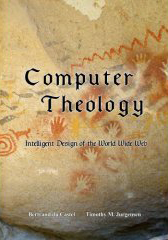PRESS
 |
Illustrations:
|
COMPUTER THEOLOGY |
||||
|
and some collection of suppliants
of that deity in a structured relationship. In such a relationship, an
unconditional covenant might entail the conveyance of some form of grace from
the deity to the suppliants, while a conditional covenant might provide a
specification of an edict to be adhered to by the suppliants in exchange for
the blessings of the deity that are provided as a result of the relationship. In Chapter 5,
when we first discussed the concept of agreements or contracts, we recognized
that under our current legal system only conditional covenants typically
warrant enforcement under law. An unconditional covenant is generally viewed as
a gratuitous promise and would likely not elicit enforcement under law should
the promising party fail to provide the indicated consideration. But the
recognition that a covenant between deity and suppliants is unconditional takes
full significance if the deity does not fulfill the promise of the covenant. In
this case, the trust established in the deity by the suppliant is lost, and
with it the basis of the entire social ecosystem. Therefore, an unconditional
covenant does not warrant enforcement unless it actually forms the keystone of
the entire trust infrastructure, where it meets the ultimate retribution. If the covenant
is conditional, then the suppliant trusts that the deity will keep the promise
made as long as the suppliant provides the indicated consideration. If the
suppliant provides consideration to the deity, and the covenant promise is not
kept by the deity, then trust is compromised, and consequences ensue. The
rituals associated with both the maintenance of trust and the management of
consequences to violations are an essential part of the trust infrastructure.
With its unconditional and conditional components, the trust infrastructure
forms the basis for establishment of the policy infrastructure of the social
ecosystem. In turn, prayer allows suppliants to call for redress of the policy
infrastructure via a natural recursive path, first towards a conditional
covenant that readily contains mechanisms of arbitrage, and second to the
ultimate unconditional covenant that can only provide remiss in the most
intimate of redress, ecstasy, or apostasy. Christianity, Islam
and Judaism trace their theological lineage back to a common event; the
establishment of a covenant between God and Abraham. While this is ostensibly
viewed as an unconditional covenant, one can discern the elements of a
conditional covenant as well. The Book of Genesis in the Christian Bible contains the declarations of, depending on how one
interprets them, one or more distinct promises. Genesis 12:2 presents God saying to Abraham “I will make you into a
great nation and I will bless you; I will make your name great, and you will be
a blessing.” One can view this initial promise as an
unconditional covenant that establishes a deity to suppliant relationship
between God and Abraham and his descendants. If, however, one considers the
entire Book of Genesis as establishing either a single covenant or a set of
interconnected covenants, then Genesis
22:18 “and in your descendants all the nations of the earth shall find
blessing -- all this because you obeyed my command” would seem to rather
clearly establish a conditional covenant. A subsequent covenant is recognized in Christianity and Judaism in the form of the Ten Commandments given to Moses. This is a conditional covenant that is something of a template for social compacts. Social compact is the general term for the establishment of a governance relationship. It generally calls for a group to forfeit some aspect of the freedoms that they might enjoy operating under the policy machinations of the physical ecosystem in exchange for the establishment of a social ecosystem that can offer protection and other benefits from the threats posed by any containing ecosystems. |
||||
|
||||
© Midori Press, LLC, 2008. All rights reserved for all countries. (Inquiries) The contents of ComputerTheology: Intelligent Design of the World Wide Web are presented for the sole purpose of on-line reading to allow the reader to determine whether to purchase the book. Reproduction and other derivative works are expressly forbidden without the written consent of Midori Press. Legal deposit with the US Library of Congress 1-33735636, 2007.
|
ComputerTheology Intelligent Design of the World Wide Web Bertrand du Castel and Timothy M. Jurgensen Midori Press, Austin Texas 1st Edition 2008 (468 pp) ISBN 0-9801821-1-5 |
Book available at Midori Press (regular) |